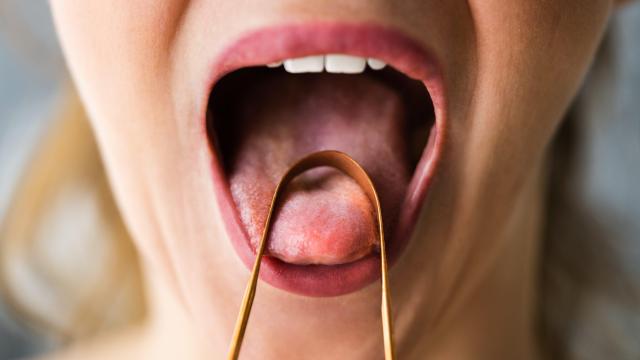You may floss, brush morning and night, get twice-yearly cleanings, and use mouthwash at the right time. But, are you also scraping your tongue? If not, you may want to add this step to your routine to raise your oral hygiene to the next level.
What is tongue scraping?
Though a relative newcomer in western dental care, tongue scraping has been practiced in traditional Indian medicine (Ayurveda) for centuries. It is the practice of running a simple, U-shaped plastic or metal tool across your tongue “to remove bacteria, food particles, and other debris from the surface.” Though, as dentist Dr. Jordan Davis notes, “tongue cleaning is a practice that is not highly discussed or valued within the [American] dental community,” there are many benefits to tongue hygiene.
Is it any better than brushing your tongue?
While brushing your tongue is better than not cleaning your tongue, a scraper is designed to get down in between the hundreds of tiny bumps or “papillae” covering the surface to unearth dead cells, trapped debris, and bacteria hiding in the crevices.
According to dental hygienist Whitney DiFoggio, “Tongue scraping is far better at removing food particles across your tongue than brushing is. The benefits of tongue scraping are immediate. And extremely noticeable.” (So noticeable, she warns, we might be “shocked or disgusted” the first time we use one.)
Registered dental hygienist Tenika Patterson of the Cleveland Clinic echoed that sentiment. “Brushing is OK to do, but think about it this way — if your carpet is dirty and you scrub it, the dirt’s going to get embedded down in there. But if you scrape it, it’s going to come right off the surface.”
What are the benefits of tongue scraping?
- Reduce bad breath: Difoggio notes on her website TeethTalkGirl, “Those small, finger-like projections [papillae] are known for harbouring as much as 90% of the bacteria responsible for causing bad breath.”
- Improve sense of taste: One study published in the Journal of Clinical Periodontology showed that tongue scraping for two weeks “improved taste sensation” enabling your taste buds to better distinguish flavours.
- Remove harmful bacteria: This study published in the National Library of Medicine revealed that tongue scraping twice daily for 7 days caused a “significant decrease” in Mutans Streptococci and Lactobacilli — bacteria that cause dental decay and bad breath.
- Better overall oral health: According to the Cleveland Clinic, while your tongue does contain healthy bacteria, some bacteria left behind after brushing are harmful and contribute to “tooth decay and gum infections.” Tongue scraping can minimise prolonged exposure to bacteria that can inflame your gums and cause cavities.
How do you use a tongue scraper?
If used improperly, a tongue scraper can be ineffective or even painful. After sticking out your tongue, place the scraper as far back as you can without triggering your gag reflex. Drag the tongue scraper from back to front using moderate pressure — don’t scrape too hard. Rinse the scraper, and repeat the process 2-3 more times — once a day — for optimal results.

Leave a Reply
You must be logged in to post a comment.